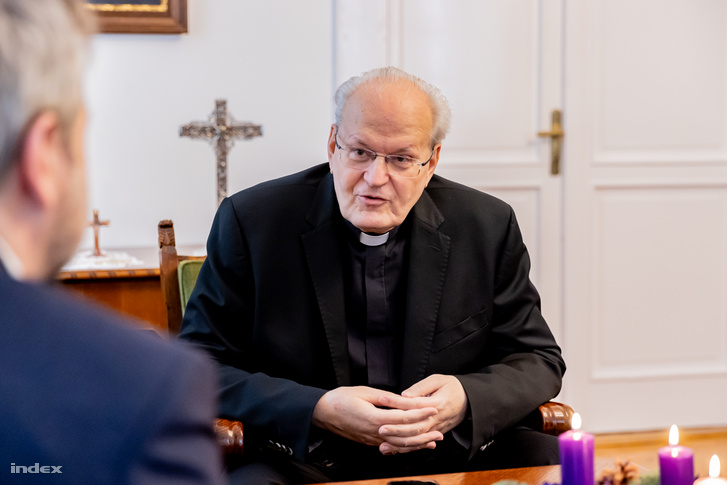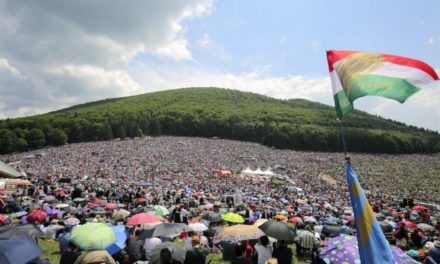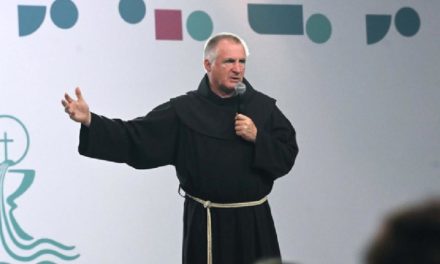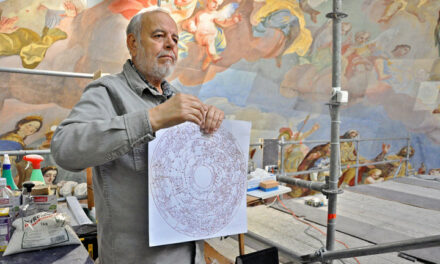In the Christmas interview, the cardinal spoke about the ever closer relationship between the Vatican and Budapest, the papal peace mission, and the challenges of the 21st century.
In October, he visited Pope Francis in Rome. Did you mention your visit to Hungary in April? Was the event rated?
Even in the days of the visit, it was evident that it was a great success. It was a great success both from a pastoral and cultural point of view. At the same time, it was obvious that the Holy Father also felt comfortable among us. He saw that there were really large crowds gathering here and he was warmly received. I think this is an essential element.
It was also important that in his speeches - which have just been published in Hungarian and in other languages - he repeatedly referred to Saint Stephen and other Hungarian saints. Here he was also able to perceive the role of Hungary's bridge.
So it was a very positive experience. On October 2nd, when we thanked him for the visit in Rome, he asked what we were asking of him. First of all, we asked for his blessing and an appointment. We would like to be able to thank him for this visit together in the form of a national pilgrimage sometime in April 2024, and to strengthen the relationship with Peter's successor and the Roman Church.
What was Pope Francis' response?
He said yes. Moreover, he very kindly made it possible for the Hungarian pilgrims not only to participate in a general hearing, but also to receive our group separately. This is a very positive gesture.
Rome-Budapest axis: Hungary has a special mission
Pope Francis has a fairly good relationship with the Hungarians. For example, in August, the Reformed President Katalin Novák visited him, with whom he had a long conversation about pressing social issues. To what do the Hungarians owe the attention?
There are many topics on which the Holy See and Hungary agree. One example is the issue of peace. At the same time, it is also very important how a religious community relates to its own religious identity. We Hungarians have learned during the last millennium that our relationship with the Holy See, the papacy, also means our belonging to the Western world. It is even more important for a believer, since we believe that the fullness of Christ's heritage can be found in the Catholic Church, and that the papacy as a symbol has always been present in history.
"Christ is our future" was the motto of the papal visit. Why was this chosen?
First of all, because it needed a short sentence. Secondly, because the world looks at Europe like this: it is a tired continent, it has already given up its faith, its culture, everything, and maybe it doesn't even know if it has a future.
We say that if Christ is our point of reference, then we have a future.
Why is that? Well, primarily because Christ holds the promise of eternal life for all people. But also because Christianity made Europe Europe. Even before Christianity, there was a political, economic and cultural community, it was called the Mediterranean world, where the Roman Empire or Greco-Roman culture extended. Later, during the Middle Ages, those peoples who accepted Christianity belonged to a cultural and religious community. It is sad that in 1054 there was a split within Christianity, and Eastern and Western Christianity separated from each other. But it is precisely at this point that Hungary has a special vocation, since the church was still unified in the time of King St. Stephen, and that is why Stephen is revered as a saint not only by the Roman Church, but also by the Orthodox churches. He died in 1038, so before the schism.
Pope Francis wants to play a mediating role in the Russian-Ukrainian war. Can Rome succeed in this?
I don't think the Pope would offer the parties concrete terms for a truce. It is likely that the warring parties do not expect the relevant instructions from him either. However, the Pope does not stop testifying in favor of peace and emphasizing that peace and the protection of human lives come first.
Nationalism, consumerism and Islam
As early as the 1990s, American newspapers published articles about Europe being a post-Christian continent. It can be seen that the communities with an Islamic background are getting bigger and more dominant in Western Europe. Do you think Islam and Christianity have a common future on the continent?
It depends on many things. In the first centuries of the Middle Ages, Islam became the dominant religion in many areas where the majority had been Christian before. I am thinking of North Africa and many countries in the Middle East. But this process was not at breakneck speed. My Middle Eastern friends, even Christian patriarchs, say that the XX. At the beginning of the 20th century, 37 percent of the inhabitants of the Ottoman Empire were still Christians. Yes, but Western nationalism came, which was implanted in the consciousness and society of these peoples, which was accompanied by impatience. Sometimes with religious, sometimes with national or ethnic impatience.
It's really the XX. second half of the century and the XI. century is the period when the proportion of Christians in the Middle East decreased rapidly.
So the disappearance of the Jewish and Christian communities can't be blamed solely on Islam?
A combination of several factors led to this – for us – sad result. At the same time, we can learn a lot from the Christian communities in the Middle East. How did they survive the minority situation that belonging to different Islamic states and empires meant for a thousand years? First of all, they were united not only in terms of religious life, but in all areas of life.
According to Eastern Christians, the Islamic threat is dwarfed by Western secularization, which is causing masses to turn their backs on their religion.
Nationalism in the 18th and 19th centuries. century, it was the first step of secularization. But tendencies appeared that made the nation the main value. This was what XI. Pope Pius Mit Brennender Sorge and described it as idolatry. And, of course, consumerism, when the nation and culture no longer matter, only the search for momentary well-being is considered the highest value. This is a very big danger worldwide today.
Hungarian education is in a double tension
Census data was made public. It is clear that the leaders of the churches are disappointed because they expected something else.
I have never agreed with the question of religious affiliation being asked in the context of the census in Hungary. Why didn't I agree with him? Because during the 1989-90 revolution, it was constitutionally established that the state could not keep records of citizens' religious affiliation. This is a separation system that can work very well. Religious affiliation can be asked in a census, but anonymity must also be guaranteed.
Is the number of believers decreasing?
In our diocese, we can primarily rely on our registers. Based on this, we say that with the decrease in the population of Budapest, we can also observe a decrease in the number of baptized Catholics.
The thinning out of young people after joining the EU in 2004 was visible. Recently, I don't feel any more big changes, but you have to fight for the people who live here.
I think it is very important to give the believers a sense of trust and communal homeliness.
What changes did the challenges of the 21st century trigger in the life of the Roman Catholic Church?
It cannot make a big difference in our goals, because, as they say, the glory of God and the salvation of souls are our real goals. We do not determine this either, but we received it from Christ, who is our founder. However, it is certain that our institutional reality has been greatly transformed in the last thirty-some years. In our case, the public education and social areas came to the fore. This was the intention of the policy even at the moment of the transition. Probably better and to a greater extent than the church itself would have thought at the time.
At that time, we had no manpower reserves, since in 1950 our institutions were taken away and 10,000 monks were interned. Now those ten thousand people are missing from the system.
If so many people worked in our schools and social institutions, only on the basis of their monastic vocation, under the sign of poverty, then the situation would be completely different. However, formally we operate in the same way as any other similar institution. We work with secular employees. In the meantime, monasticism also underwent a profound change in the world church.
What do you think about the state of education?
We have been talking with teachers for a good year. Various professional working groups are active within the Hetvenké Tanitvány Movement. We organized a conference in the building of one of the Catholic high schools, to which we also invited foreign speakers. It seems that we are not so bad after all. A Central and Eastern European institution always lives in a double tension, be it education or any other field, because it is characterized by over-regulation at the Western level, but at the same time, in comparison, there is always relatively little funding. This is not the case in the third world. There is little funding there, but it is not so over-regulated. So it is possible that they only learn to read and write and English, and they don't pay much attention to the square meters of the building where all this education takes place. I would say that we are peripheral, we have lived on the edge of the Western world for a thousand years, and this is evident in many things.
But this is what we were given, and in this we can find our own creativity.
When will the Messiah come again?
In December, all NGOs are more active. What well-functioning Catholic charitable organizations are working in Budapest and in the country as the holidays approach?
As Christmas approaches, believers look to the person of Jesus Christ. That he is a real historical person, a real man, who is a real God, and thus brought the brilliance of divine perfection among us. In such cases, a person is especially receptive to doing something good for others. That is why we collect non-perishable food and money before Christmas - very widely. Each parish donates to the benefit of the poor living in its area. We also have special collections for the benefit of Ukrainian refugees. Similarly, at this time, one notices the homeless and the poorest.
In addition to the well-known Maltese Charity Service and the national and diocesan Caritász, smaller organizations are also active, such as the Csak Eget Szolgálat VII. district.
They distribute breakfast, run a day room and take care of 180 people every day. I think it is very important that the visually impaired, the hearing impaired, and the mobility impaired also come to the fore. In the prophet Isaiah, we read: the signs of the coming of the Messiah are that the deaf hear, the blind see, the lame walk, and the poor are told the good news. These are symbolic actions that must be done not only symbolically, but also in reality, with heart and soul.
When will the Messiah come? The difference between the Jews and the Christians is that the former say: it will come at last, and the Christians, it will come again.
One of the essential beliefs of Christianity is that Jesus Christ is the Messiah. His disciples recognized the Messiah in his person and therefore formed separate communities. Jesus himself speaks about the coming of the Son of Man in the clouds of heaven. It says in the Gospel of John that the Son of Man did not come to condemn the world, but that the world might be saved and saved through him. At the same time, he himself says that when the king, the judge, comes, he will put people on the right and on the left, and their fate will be determined according to their actions.
So we await the judgment, but not with dread.
The Christian believes in the end of the world. He connects the second coming of the Messiah with the end of time. Today, when many people are anxious, afraid of the destruction of our environment or of wars, we say that this is all very sad, but one day history will end, that's for sure. And this end - for a believing Christian - is not scary, but desirable, because it brings the happy encounter with Christ.
Featured image: Zsófi Szollár / Index












